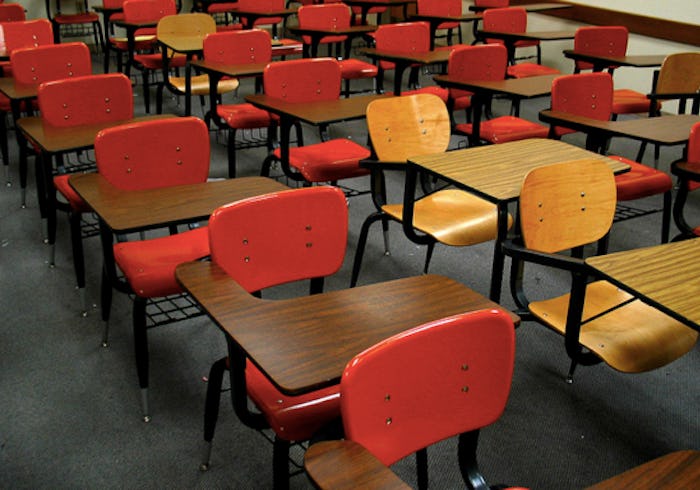In order to decrease the number of STIs and pregnancies in teens, schools need to step up their sex-ed game. But, instead of informing teens about sexual health, there are some disturbing ways sex-ed is shaming kids in schools. This is all kinds of messed up, because school is a place kids turn to for knowledge and power, which go hand-in-hand. But in 2011, approximately 24 percent of new HIV diagnoses were young people ages 13 to 24, according to a 2016 report published by the National Conference of State Legislatures.
When schools are withholding information that can save a teen's life, that's not only shaming kids, it's downright shameful. What's even more frightening about the aforementioned statistic is that it's preventable. But in order for this to happen, school sex-ed curricula needs an overhaul in the United States, where there is no federal policy in place that guarantees what kids are taught about sexual health.
The emotional health of kids is also at risk if people don't advocate for a more progressive way of communicating human sexuality to today's youth. This requires sex-ed curricula to be sensitive to the experiences of all kinds of kids, from those with disabilities to the LGTBQ community. Rather than giving these teens the support they need, sex-ed can sometimes end up shaming kids and doing an entire generation a disservice. So what needs to change? A whole lot.
1Sex-Ed Information Is Not Always Inclusive
What is being taught in sex-ed is horribly outdated. Only 20 states mandate sex education and HIV education, according to a 2016 report published by the National Conference of State Legislatures. On top of that, many sex-ed curricula don't include cis, trans, or gay experiences when talking about sex. But there are advocacy groups to reach out to in order to make sex-ed more inclusive.
2In Some States, Parental Consent Is Required
In some states, parental consent is required before kids can receive sex-ed according to the 2016 NCSL report. Most states make parental involvement part of sex-ed, allowing parents to become involved in what's being taught. When kids feel like they're being policed by their parents, at home and at school, they're likely to feel shame. Psychologist Peggy Drexler wrote in Psychology Today that some parents unintentionally shame their children in pursuit of discipline. Professionals, trained to counsel adolescents about sexual health seem like a more logical choice to design sex-ed curricula.
3Sometimes, Sex-Ed Curricula Is Incorrect And Bigoted
In 2014, the New Republic reported that a sex-ed class in Mississippi taught students that being gay was illegal. Perhaps this school needs to rethink its history curriculum as well: the Supreme Court rendered all state laws against gay sex unenforceable in 2003.
4Abstinence Programs Are Misleading And Discriminatory
Some states enforce school sex-ed curricula called "abstinence plus." Note the moral judgement that abstinence is the best choice implicit in the name of the program. In this curricula, according to the New Republic teachers can't even talk about birth control or abortion.
5Condom Demonstrations Are Still Banned In Some Schools
What message do you think it sends teens if you ban condom demonstrations? Yet, even in liberal cities like New York, the public school system banned condom demonstrations up until 2015. Melisa Garber, a health teacher at St. Ann's in Brooklyn told Refinery29 that "the failure rate attributed to condoms is because of human error." So why make using condoms shameful rather than safe?
6Cyber Bullying Is Still A Big Deal, And Schools Need To Step In
A recent article on Feministing detailed several Facebook groups dedicated to slut-shaming and cyber-bullying girls. Sex-ed is not doing enough to prevent this type of shaming outside the classroom, and it ought to.
7Withholding Lifesaving Information Is A Human Right's Violation
According to the Centers for Disease Control and Prevention, 44 percent of female teenagers and 47 percent of male teenagers between the ages of 15 and 19 are sexually active. That's a lot of kids having sex. In an article for Al Jazeera America, Erika Sanchez wrote, "to withhold critical, lifesaving medical information from young people is a violation of their human rights." When sex-ed doesn't reflect what kids are doing, how sex can have an impact on your physical and mental well-being, what's happening to your body, not to mention issues of consent and sexual assault, it's time to fight the power.
Sex-ed is a program meant to protect kids and guide them to be strong, consenting, sexual beings. The last thing it needs to do is shame them.
